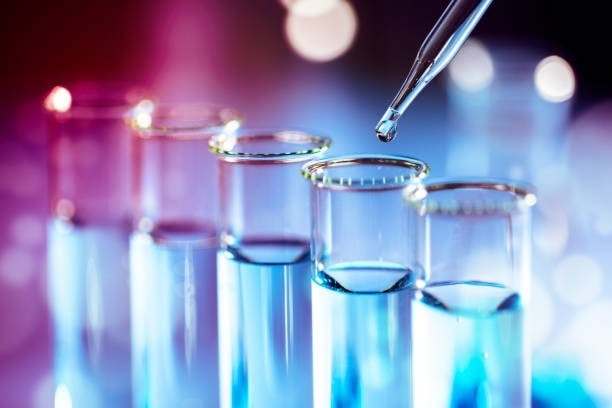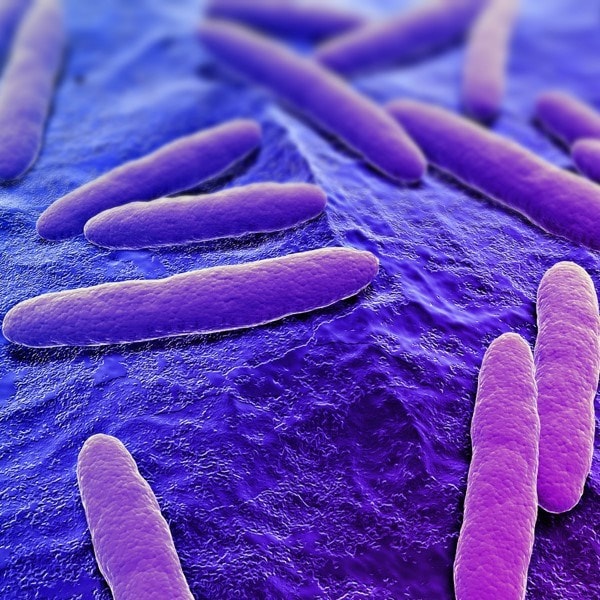Probiotics: do they work, and where’s the evidence?
In recent years, the market has become saturated with natural probiotic products of types, all boasting new delivery mechanisms, extremely high billions count, numerous in-vitro tests, and so on. Whilst in-vitro tests are extremely important, and a bacterial strain must demonstrate that it can survive stomach acidity, the most important factor to consider is whether the strain has subsequently been used in human clinical trials and found to offer a health benefit to the host!
When selecting a live cultures supplement, it is critical to question the number - and quality - of the human clinical trials that support it.
Within this artile:
- Clinical Evidence for Probiotics
- Use a probiotic brand you can trust
- Multistrain probiotic clinical trials
- Powerful probiotic combination researched for the support of vaginal health
- Single strain probiotic clinical trials

Clinical Evidence for Probiotics
Evidence from in vitro test tube studies versus actual human studies is very different. When researching the most appropriate strain for their patients, healthcare professionals should review the evidence and look at the results, rather than falling victim to the trial halo effect, and ask themselves if the study had a genuinely significant outcome.
Selective reporting of trial evidence can be misleading for healthcare professionals, so it is important to buy from a brand which is transparent. Probiotics and other food supplements and nutraceuticals are often used by those in vulnerable groups and poor health, so it is the responsibility of their supporting clinicians to do their homework.
It is important that practitioners do not fall for aggressive marketing tactics and ‘cure all’ claims.
For further advice on how to accurately review research studies, read this article by microbiologist Dr. Kate Steed in the Probiotics Learning Lab: Research - is it all equal?.
Use a probiotic brand you can trust
When selecting a probiotic supplement for your clients, you need to be confident that you're receiving a well-researched range supported by the results of literally hundreds of published human clinical trials on both the individual strains and the finished products in the range, and further ongoing clinical trials which are yet to be completed and/or published.
Your chosen brand should be completely transparent about the ingredients in their products and the details of the related studies.
Beware of aggressive marketing and a ‘one size/supplement fits all’ approach. Choose brands where the evidence speaks for itself. Choose a brand that’s secure in its own market position, that respects (and often supports) our competitor brands, and offers impartial advice and educational resources. Look for a company with a genuine desire to empower millions to support their health, using the strain of probiotics most appropriate for their individual needs.
To find out the best way to find credible resources, look at this article written for the Probiotics Learning Lab by microbiologist Dr. Kate Steed: Researching Probiotics Online
Ultimately, look for products from companies that use highly researched strains of probiotics, those which have yielded statistically significant results when trialled. Many companies will manipulate evidence to highlight certain positive aspects of a trial, but the overall results may be disappointing. They may also conduct the research themselves, and therefore will have a vested interest in the outcome. Choose supplements where the evidence from the clinical trials is easily accessible, has been conducted by a variety of credible institutions, and is statistically significant.
Below is a selection of the gold standard research using some of the world’s best probiotic strains:
Multistrain probiotic clinical trials:
‘’Lacidofil’ probiotic combination researched for the support of gut health in those taking antibiotics3
The two-strain probiotic combination of Lactobacillus rhamnosus Rosell-11 and Lactobacillus acidophilus Rosell-52 has been featured in numerous clinical trials.
In one of the most notable studies1, 244 participants aged 0-17 years with acute respiratory, urinary, or digestive problems were randomly split into two groups. 117 participants were given antibiotic therapy with probiotics and 127 took antibiotic therapy alone.
Results indicated that those in the probiotic group were 1.5 times less likely to develop antibiotic-associated diarrhoea, 10 times less likely to carry C. difficile and 8 times less likely to test positive for C. difficile toxins A + B, compared to the control group taking antibiotics only.
The evidence from this trial suggests that probiotics, when taken during a course of antibiotic therapy, may offer support for gut health in patients taking antibiotics.
'Saccharomyces boulardii' researched for the support of diarrhoea symptoms.
Over 80 clinical trials have investigated the effect of the microorganism Saccharomyces boulardii, on a wide range of digestive complaints including IBS, Crohn’s disease, ulcerative colitis and most notably, diarrhoea.
In one example2 92 adults with acute diarrhoea were randomised to receive either Saccharomyces boulardii or a placebo. By the third day there had been a significant decrease in the severity of diarrhoea (calculated as the number of stools x consistency) in the Saccharomyces boulardii group, from 22.7 to 5.5 (-17.2), whereas the placebo group saw significantly less of a decrease (-13.6). Furthermore, the Saccharomyces boulardii group saw significant improvements in nausea scores, as well as increased patient satisfaction with the treatment, when compared to the placebo group.
Powerful probiotic combination researched for the support of vaginal health
Two of the most extensively researched strains of bacteria in the world have been researched most specifically for vaginal health. This probiotic combination, Lactobacillus rhamnosus GR-1® and Lactobacillus reuteri RC-14, has been clinically trialled in thousands of women for more than twenty years. They have been shown to improve the balance of vaginal microflora and protect against common intimate health conditions.
One of the largest randomised, double-blind, placebo-controlled trials using these two probiotic strains took place in 20133. The focus of the trial was to assess the efficacy of the probiotic combination in alleviating Bacterial Vaginosis symptoms. The trial monitored a total of 544 women who had all been diagnosed with bacterial vaginosis. The participants were divided into two groups, either to be given a placebo, or the probiotic capsules, for a period of six weeks. Vaginal swabs were taken at week six, then again at week twelve. The results indicated that the vaginal microbiota had normalised in 243 (61.5%) of women in the probiotic group compared to only 40 (26.9%) of the women in the placebo group. This was recognised as a statistically significant result.
For more details of the research using these world-renowned probiotics, visit their entries in the Probiotics Database: Lactobacillus rhamnosus GR-1® and Lactobacillus reuteri RC-14.
Single strain probiotic clinical trials
Lactobacillus paracasei CASEI 431® researched for immune support
This probiotic strain has been trialled in over 20 human clinical trials looking at the support of immune health, including one of the largest ever clinical trials looking at the effects of probiotics and immunity.
This randomised, placebo-controlled and double-blind study4 used a total of 1104 healthy participants, randomly allocated into a probiotic and a placebo group. Those in the probiotic group were given a milk containing one billion CFU of the probiotic strain Lactobacillus paracasei CASEI 431®. Those in the placebo group were given a milk which looked identical but which did not contain a probiotic. All participants took the milk supplement daily for 6 weeks. To assess the effects of the probiotic supplement on immune function, all subjects were given an influenza injection 3 weeks into the study.
The results showed that the duration of flu-like symptoms was reduced by 3 days in those taking L. paracasei CASEI 431®, compared to those in the placebo group, a reduction of 41%.
Those in the probiotic group displayed a symptom severity score of 12% lower than the placebo group, and consequently were less likely to require antibiotic treatment.
For more details of this trial, and the numerous other trials using this premium probiotic strain, visit its entry in the Probiotics Database: Lactobacillus paracasei CASEI 431®
Bifidobacterium breve M-16V® researched for immune support, allergies, and gut health
This strain has been used in thousands of participants over 36 clinical trials involving adults, children, babies, and even preterm infants. It is in regular use in 120 neonatal intensive care units in Japan, Australia, New Zealand and Singapore.
The strongest clinical evidence lies in the strain’s ability to increase levels of Bifidobacteria in the infant microbiome and reduce numbers of pathogens associated with health and digestive issues.
In 2004, a randomised controlled trial5 demonstrated that B. breve M-16V® was able to significantly increase Bifidobacteria levels in a group of very low birth weight (VLBW) infants. The babies were divided into three groups, two probiotic groups who either received a probiotic supplement approximately 7.2 hours after birth, approximately 36 hours after birth, and a control group. Results indicated that the first group had a Bifidobacterium dominant microbiome by week 2, the second group had achieved this by week 4. No populations of Bifidobacteria were found in the majority of the control group. Furthermore, in group 1, numbers of Enterobacteriaceae significantly decreased suggesting the strain was able to reduce pathogens and positively rebalance the microbiome of these infants.
You can find B. breve M-16V® in Optibac Baby Drops.
For more details about the studies using some of the world’s most researched probiotic strains, visit the Probiotics Database.
References
- Maydannik, V. et al (2010) Efficiency and safety of Lacidofil in children with antibiotic-associated diarrhoea caused by Clostridium difficile. Paediatrics, Obstetrics and Gynaecology 3 53-57.
- Saccharomyces boulardii in acute adult diarrhoea: Efficacy and tolerability of treatment. Höchter W, Chase D & Hagenhoff G Münch. Med. Wschr 132 12 188-192
- Vujic et al., (2013), ‘Efficacy of orally applied probiotic capsules for bacterial vaginosis and other vaginal infections: a double-blind, randomized, placebo-controlled study’. Eur. J. Obstet. Gynecol. Reprod. Biol., 168(1): 75-9.
- Jespersen L. et al., (2015), ‘Effect of Lactobacillus paracasei subsp. paracasei, L. casei 431® on immune response to influenza vaccination and upper respiratory tract infections in healthy adult volunteers: a randomized, double- blind, placebo-controlled, parallel-group study’. Am.J.Clin.Nutr., 101:1188-1196.
- Li Y et al. (2004). Effects of Bifidobacterium breve supplementation on intestinal flora of low birth weight infants. Pediatr. Int, 46: 509-515
Popular Articles
View all General Health articles-
General Health13 Feb 2024
-
General Health25 Sep 2023


